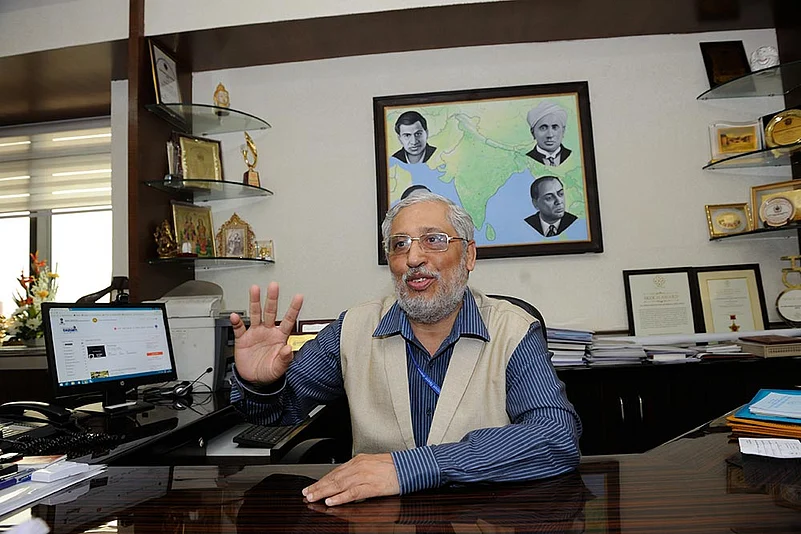Anil Sahasrabudhe, chairman, All India Council for Technical Education (AICTE), tells Bula Devi that India needs to focus on better-quality degree education in engineering, while not ignoring the ITIs and polytechnics.
Experts believe our engineering institutes are producing sub-standard engineers and there is a dearth of good engineers...
To a certain extent it is true. While a large number of students enter the system, not all are found to be employable by some industry bodies. It is not true that all students graduating are not up to the mark. Moreover, all colleges are not of the same level—some are quite good, some are on the fringe and need assistance to become better, while others are very poor in quality. It is students from these poor-quality colleges who find it difficult to get employment.
What are you doing to tackle sub-standard institutions?
On the basis of computer-generated list of institutions (through random number generation), we conducted surprise INSpections in 311 colleges recently. Colleges that were found to be good are allowed to function with full approved seats. Those found wanting in key parameters—faculty, infrastructure, labs, facilities—were penalised, either by reducing the number of seats or calling off admissions for a year and, in worse cases, closure. This exercise covered three per cent of the more than 10,500 such institutions. We have also warned institutions with more than 70 per cent vacancies for consecutive years may face closure from next year.
We get to see more engineers engaged in sales and marketing than going to shop floors, while polytechnic diploma holders are mostly doing the pure technical work. Isn’t something wrong there?
This is partly a worrisome fact, but I wouldn’t agree fully. Are there enough jobs on the shop floor? No. The number of students with engineering degrees is far more than the jobs available on the shop floor or in core engineering areas. So, if some trained engineers go for marketing, especially in engineering products, what is wrong with it? They are the best people to explain to the industries about the specifications and properties of a product. Some also undertake product-servicing jobs. Some go in for R&D or product development. Unfortunately, some go for bank jobs or non-engineering sales jobs. Of course, lack of job opportunities in their areas of interest is a major factor for them to go for such jobs. But, in most cases, they are doing jobs related to their background. For instance, many go to the IT and services sectors. If they are coding for various engineering applications, there is no problem because one needs engineering domain knowledge for coding.
Does this have to do with shortage of jobs?
Yes, this is the reason why AICTE is encouraging students to launch startups and not depend on government or corporate jobs alone. It can be in software, hardware, IT industry, services sector and so on.
It is said fresh graduates mostly have insufficient technical information and lack client-handling skills. As course correction, isn’t there a need to revisit the syllabus and bring in more exposure and physical engagements with the industry?
Absolutely. Last month, we had a meeting and a 10-point agenda was drawn in which curriculum revision was the first priority. New syllabi will be implemented from this semester. Committees have been set up, comprising professors from IITs, industries and so on, and the syllabi will be prepared in such a manner that it caters to today’s demands, while looking at future needs as well. It will be a model curriculum. Individual institutes or universities have the freedom to adopt this model curriculum and tweak it as per local needs. Internship in industries will be made mandatory so that students get exposed to actual industry practices. They will pick up threads from there and that will open the doors of employment for them. People from industry will also take classes for students as adjunct faculties. These measures won’t show results overnight, but will yield positive results after a couple of years. The deadline set for the new syllabus is June 30, so that it can be implemented from the forthcoming academic year.
If we have to prioritise, should there be more polytechnic institutions, ITIs or engineering colleges?
We need all of them because manpower is needed in all sectors and at all levels. However, among the three, more ITI-background people are required in the industry, followed by polytechnic diploma holders and then engineering degree holders. The real concern is the quality of education, which is suffering in many institutions. This, indeed, is a worrying factor and hence that is where we need to concentrate, check poor-quality institutes, support well-performing ones and mentor those in the middle level. If quality engineers are produced, they will not only get placed in India, but in many other countries where there is a demand as their population is ageing.


























